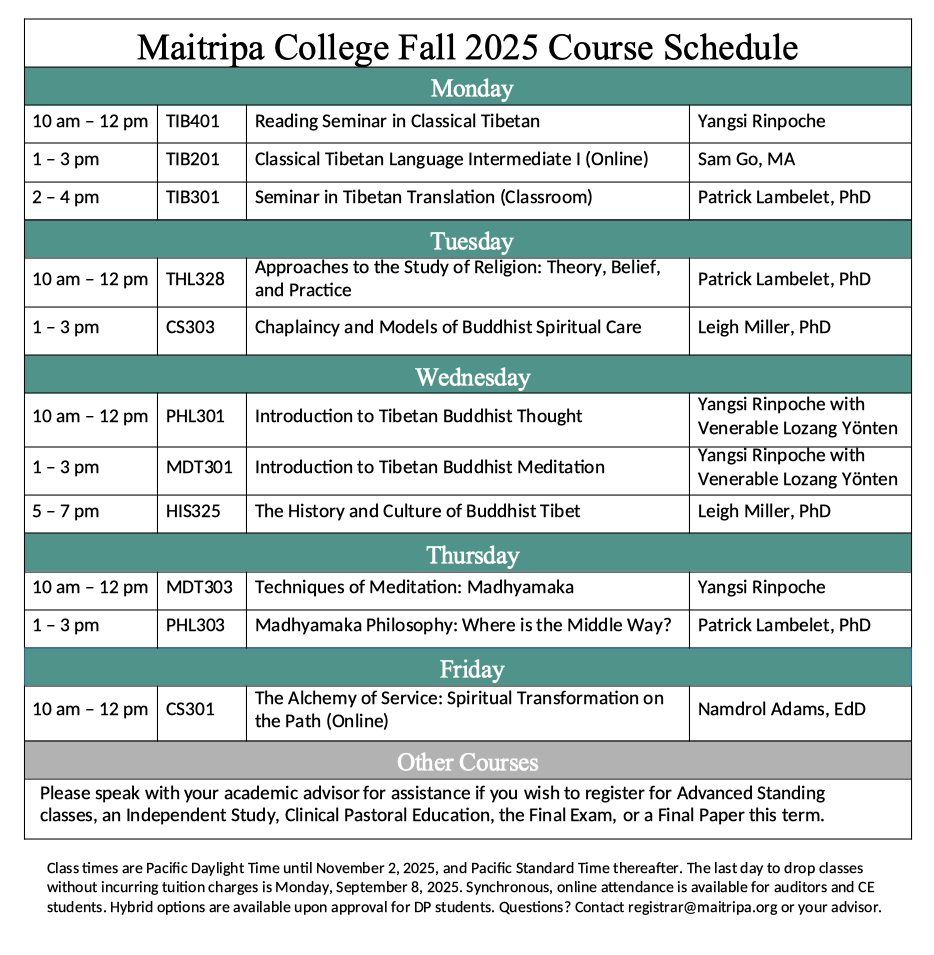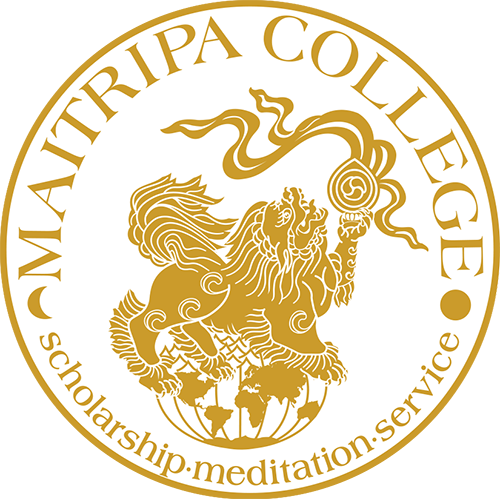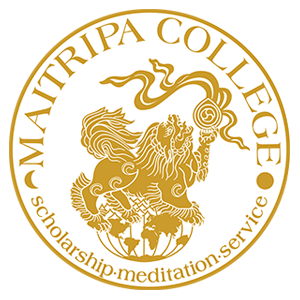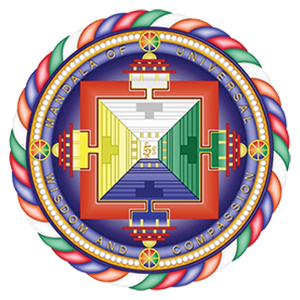FALL 2025 ENROLLMENT IS NOW OPEN
Click here for all academic deadlines (application, registration, scholarship application, etc)
Fall 2025 course descriptions are at the bottom of this page and faculty bios are here

Fall 2025 Course Descriptions
CS301: The Alchemy of Service: Spiritual Transformation on the Path (Online) (2 credits)
This course introduces students to foundational Buddhist principles of service as a path to spiritual transformation, and how our suffering can inform it. Emphasizing bodhicitta—the aspiration to awaken for the benefit of all beings—students will reflect on the role of compassionate action in both personal and communal development. Through critical engagement with foundational Buddhist teachings, students will examine how service can become a field for practice, insight, and the cultivation of wisdom and compassion. The course is supported by seminar discussions and reflective writing, and designed to integrate study and action within a framework of ethical and contemplative development.
CS303: Chaplaincy and Models of Buddhist Spiritual Care (2 credits)
Spiritual Care includes offering one’s arts of ministry and chaplaincy praxis to care for persons and systems in need, often to address suffering. Spiritual Formation in oneself leads to skillful spiritual care with others, and has become a promising and successful field of Right Livelihood for Buddhists in a variety of secular and multi-faith contexts. Through multiple roles, institutional settings, and activities, they are integrating Buddhist religious education, personal spiritual formation, and ministerial agility into their vocation outside of Buddhist communities. This course aims first to understand the history and practices of chaplaincy, and the paths (educational, personal, religious, and clinical) to professional chaplaincy as an example of integrated competencies for helping professions. The course will then explore innovations, current research, and emergent spaces in the fields of chaplaincy and Buddhist ministry and spiritual care, and prepare students to apply for Clinical Pastoral Education (CPE) residencies, or other reflexive self-study and field education. Ethical codes, standards of practice, and chaplaincy competencies will be explored towards the formulation and articulation of one’s Buddhist theology of spiritual care. Throughout, students will be invited to experience the classroom as a site for spiritual care giving and receiving through our mindful and compassionate behavior with each other, particularly while practicing reflective deep listening skills. Students will broaden their base of compassion, strengthen internal resources, and build practical interpersonal skills for any kind of helping profession or service in the world.
HIS325: The History and Culture of Buddhist Tibet (2 credits)
This introduction to the history and culture of modern and contemporary Tibet will deepen students’ appreciation for the many changes the Tibetan people have navigated in the past one hundred years to reveal a complex society which has achieved remarkable cultural and religious sustainability balancing tradition and innovation. To illumine historical upheavals and resiliency, we will engage with autobiographical and fictional literature, documentary and narrative films, historical primary sources, Buddhist and secular contemporary music and art, poetry, modern monastic Buddhist education and pilgrimage, and how Tibetan Buddhists relate their religion to everyday lives, seeking, as much as possible, Tibetan representation of Tibetan lives in all their diversity and what contributes to a shared sense of Tibetan identity among them. Students will learn an interdisciplinary approach to the study of a unique region, highlighting the interactions of Tibetan communities with others globally and Tibetan visions for their and human futures together. A few select film screenings and book discussions will be open to the community. This course’s emphasis on an interdisciplinary approach to Tibetan Buddhist civilization will also provide context for a spring in a course on Himalayan Art and Holy Objects, but the fall course will not be a prerequisite.
MDT301: Introduction to Tibetan Buddhist Meditation (2 credits)
This course will provide a broad introduction to the vast corpus of techniques and practices of Buddhist meditation, with particular emphasis on Tibetan Buddhist techniques, especially analytical meditation. The course will be taught in an interactive format, allowing students the opportunity to learn specific meditations as directed by the instructor, practice them, and discuss their experiences in class. The subject matter will parallel the topics of Buddhist philosophy as taught in PHL301. Part of this class will include regular meditation sessions out of class, the keeping of a sitting journal, and the opportunity for objective discussion on the effect of these practices on the individual’s mind. If desired, the committed student will have the opportunity to work with the instructor to design a personal meditation practice.
MDT303: Techniques of Meditation: Madhyamaka (2 credits)
This course will introduce students to some of the key structures and approaches to Madhyamaka meditation on emptiness found within Tibetan Buddhism. The topics of this course will parallel those covered in PHL303 and students will have the opportunity to integrate their philosophical contemplation within their meditation.
A blend of traditional preliminary practices, calm abiding, and specific wisdom meditations will be taught to provide a balanced and grounded framework for approaching profound meditations on the nature of reality. The course will also address common problems in establishing a meditation practice such as lack of time or inspiration. The class will consist of weekly meditations guided by the instructor, daily self-guided meditation integrating the weekly topics into the overall practice structure, three personal meditation reports, and the opportunity to meet with the instructor to design a personal meditation practice. Students are strongly encouraged to enroll in PHL303 in conjunction with this class.
PHL301: Introduction to Tibetan Buddhist Thought (2 credits)
This class will make use of philosophical treatises, literature, and historical analysis to present the foundations of Buddhist philosophy as taught by the early Indian pandits and commented upon by Tibetan scholars. Readings will include selections from the Abhidharma Kosha, Pramanavarttika, and Abhisamayalamkara, with particular focus on the readings that relate to the three scopes of the lamrim as presented by the Tibetan scholar Je Tsongkhapa. Students will come away from this course with a foundation in Buddhist philosophy and knowledge of key issues of Buddhist Studies, including personal identity and the five skandhas, subtle impermanence, and the basics of a Buddhist world view. Students will gain important grounding in basic principles of dependent arising, the structure of Buddhist logic, and familiarity with Buddhist logic and logical arguments.
PHL303: Madhyamaka Philosophy: Where is the Middle Way? (2 credits)
This course will provide an overview and in-depth introduction to the heart of the Tibetan Buddhist tradition, the philosophy and practice of the Middle Way (madhyamaka, dbu ma), as presented by Nāgārjuna, Cāndrakīrti, and their Tibetan commentators. Primary readings for this course may include Insight into Emptiness by Khensur Jampa Tegchok and Meditation on Emptiness by Jeffrey Hopkins. Students are strongly encouraged to enroll in MDT303 in conjunction with this class.
THL328: Approaches to the Study of Religion: Theory, Belief, and Practice (2 credits)
This course will examine the ubiquitous but elusive phenomenon of religion as it is studied, lived, and practiced in its myriad forms. Whether or not we consider ourselves religious, the influence of religion on the world and on society is unavoidable: it shapes our values, beliefs, social dynamics, and even economic and political systems. At the same time, it defies easy generalizations and simple definitions. We will first explore some of the most influential theories and critiques of religion, considering sociological, psychological, anthropological, and phenomenological approaches. We will then examine ways in which religious traditions address fundamental questions related to faith, ethics, mortality, and salvation. Finally, we will consider ways in which followers of religious traditions have historically responded and adapted to changing environmental and socio-political conditions, such as religious pluralism, radicalism, and ecological crisis. Students will be expected to engage directly with at least one tradition that is not their own, attending a religious service in the surrounding community.
TIB201: Classical Tibetan Language Intermediate I (Online) (2 credits)
Students continue to deepen their knowledge of Tibetan grammar and syntax through reading and decoding basic verse and prose texts and commentaries on Buddhist philosophy and practice in their original language. This course also introduces basic translation theory. Whenever possible, students receive oral commentary of the texts they are working with as part of the class, and begin to learn how to translate formal logical statements so common in Tibetan philosophical exegesis.
TIB301: Seminar in Tibetan Translation (2 credits)
Students read and translate Tibetan texts and their commentaries in their original language. In this course we will learn reading and reciting Tibetan texts, developing pronunciation, and translating with an emphasis on communicating the meaning.


